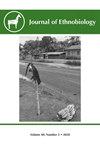寻求民族生物学出版更具伦理性的未来:从民族生物学杂志40年的视角
IF 1.3
3区 社会学
Q1 ANTHROPOLOGY
引用次数: 4
摘要
摘要学术出版界正在迅速变化。这些变化是由一系列相互交织的道德和财务考虑因素驱动的,并对其产生影响。在这篇文章中,我们将《民族生物学杂志》(JoE)广泛地置于伦理出版的话语中,特别是在民族生物学中。我们认为,作为一个严谨和社会公正的学术平台,促进民族生物学领域的核心价值观是JoE的道德义务。我们在这里讨论了JoE解决这一当务之急的多种方式,包括多样性、可访问性、透明度问题,以及这些努力如何有助于我们的持续相关性。我们发现JoE已经达到了很高的道德标准,并继续提高我们领域的标准。然而,除非我们继续适应不断变化的环境,否则货币偿付能力和最佳实践之间日益严重的不协调可能会威胁到JoE的寿命。展望未来,我们鼓励所有民族生物学家参与正在进行的出版伦理改进过程,包括仔细考虑在哪里出版珍贵的民族生物学知识。本文章由计算机程序翻译,如有差异,请以英文原文为准。
Seeking a More Ethical Future for Ethnobiology Publishing: A 40-Year Perspective from Journal of ethnobiology
Abstract. The academic publishing world is rapidly changing. These changes are driven by and have implications for a range of intertwined ethical and financial considerations. In this essay, we situate Journal of Ethnobiology (JoE) in the discourse of ethical publishing, broadly, and in ethnobiology, specifically. We consider it an ethical imperative of JoE to promote the core values of the field of ethnobiology as a platform for scholarship that is both rigorous and socially just. We discuss here the many ways JoE addresses this imperative, including issues of diversity, accessibility, transparency, and how these efforts contribute to our ongoing relevance. We find that JoE has achieved high ethical standards and continues to raise the bar in our field. However, the growing incongruity between monetary solvency and best practices could threaten JoE's longevity unless we keep adapting to the changing landscape. Looking to the future, we encourage all ethnobiologists to participate in the ongoing process of improving ethics in publishing, including careful consideration of where to publish precious ethnobiological knowledge.
求助全文
通过发布文献求助,成功后即可免费获取论文全文。
去求助
来源期刊

Journal of Ethnobiology
Social Sciences-Anthropology
CiteScore
4.80
自引率
3.40%
发文量
21
审稿时长
>12 weeks
期刊介绍:
JoE’s readership is as wide and diverse as ethnobiology itself, with readers spanning from both the natural and social sciences. Not surprisingly, a glance at the papers published in the Journal reveals the depth and breadth of topics, extending from studies in archaeology and the origins of agriculture, to folk classification systems, to food composition, plants, birds, mammals, fungi and everything in between.
Research areas published in JoE include but are not limited to neo- and paleo-ethnobiology, zooarchaeology, ethnobotany, ethnozoology, ethnopharmacology, ethnoecology, linguistic ethnobiology, human paleoecology, and many other related fields of study within anthropology and biology, such as taxonomy, conservation biology, ethnography, political ecology, and cognitive and cultural anthropology.
JoE does not limit itself to a single perspective, approach or discipline, but seeks to represent the full spectrum and wide diversity of the field of ethnobiology, including cognitive, symbolic, linguistic, ecological, and economic aspects of human interactions with our living world. Articles that significantly advance ethnobiological theory and/or methodology are particularly welcome, as well as studies bridging across disciplines and knowledge systems. JoE does not publish uncontextualized data such as species lists; appropriate submissions must elaborate on the ethnobiological context of findings.
 求助内容:
求助内容: 应助结果提醒方式:
应助结果提醒方式:


